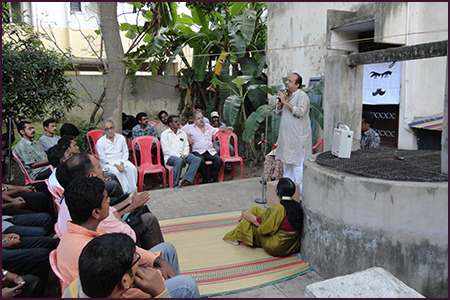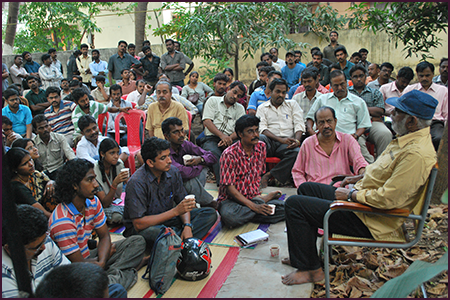 GNANI FONT Contact Us
English / îñ¤ö¢
GNANI FONT Contact Us
English / îñ¤ö¢


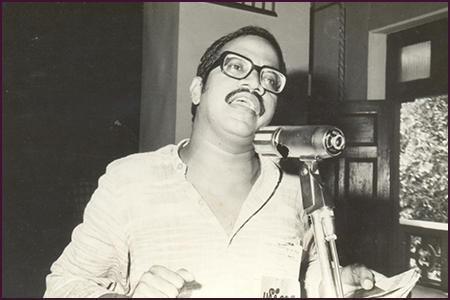
Gnani evolved in the seventies, when activities for the reconciliation of alternative culture were happening all over India through multiple platforms like magazines, movies, and drama etc.
The main reason for Gnani’s continued interest to reach out to public through various platforms, in spite of being in regular contact with the readers through newspaper writings, was his social concern. He continued to be on various platforms including magazine, drama, literature, television, painting, public speaking till his last day owing to that very concern.
He firmly believed that the question ‘whom should we stand with?’ should bring forth the only right answer ‘Along with people’ and one should have absolute clarity about it. This belief would be evident in all his writings and activities. Gnani however didn’t believe in differentiating our ‘work for living’ from our own ‘ethics & beliefs’ and hence didn’t shy away from getting into social issues than just sticking to writing about them in newspapers and magazines.
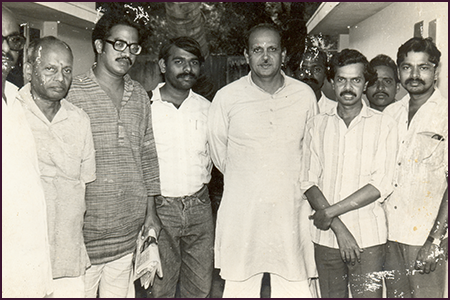
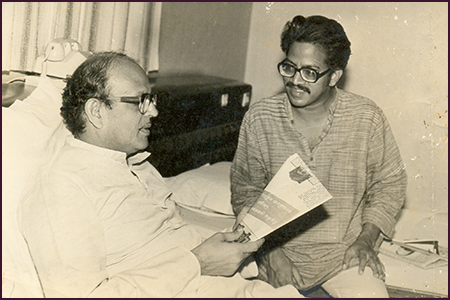
In 1971, when he was only 17 years old, he campaigned in support of the DMK who were in alliance with Central Government for bringing out reforms such as nationalization of banks, ending Privy Purse given to Royalty and a lot more socialistic initiatives.
He was also selected as the secretary of the Tamil Society in Madras Christian College after winning the college election and participated in various agitations in the college.
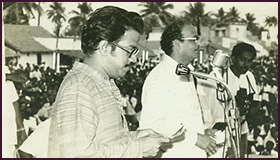
In 1975-76, he strongly opposed and was working against the Declaration of Emergency when he was serving as a journalist in Indian Express. He was in his early 20’s then.
In 1984, following the Bhopal tragedy in which thousands of people died due the poisonous gas leak, he was involved in the "No more Bhopal" campaign.
Since 1987 till his death, he was actively campaigning against the establishments of nuclear reactors in the country. He also continued to call for actions in support of women and children's rights, campaign against death penalty and pro-human rights initiatives throughout his lifetime.
In 1987, at the age of 33, he started supporting VP Singh from the time singh resigned from Rajiv Gandhi’s cabinet over the Bofors allegations, to the time BJP toppled his Government in 1990 for implement Mandal Commission recommendations.
When VP Singh formed the National Front along with DMK and spoke at the election campaign meetings, it was Gnani who has translated his speech in more than 70 public meetings all over Tamilnadu, Gnani’s regards for VP Singh stayed forever.
Apart from writing about various issues in his columns Gnani also actively campaigned on field to create widespread attention in issues such as awareness initiative about the rule 49-O for those who doesn’t want to cast their vote in support of any nominated candidates, the motion against Sri Lanka, and Articles supporting Reservation, Jan Lokpal Bill and anti-corruption etc.
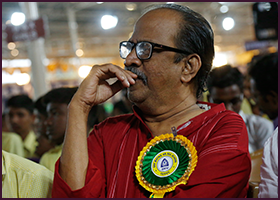
He also actively participated in a protest Tamilnadu journalists staged against the imprisonment of S. Balasubramanian, editor of Ananda Vikatan over a cartoon against the government as a then secretary of Madras Reporter's Guild.
In 1954, the then Congress state government brought a relic of the British colonial censorship rule 'Tamil Nadu Dramatic Performances Act' to curb MR Radha's rationalistic rhetoric. In 2012 Gnani filed a case against it in Chennai High Court. He won the legal battle and put an end to the 58 year old rule, when the court declared the provisions of the Tamil Nadu Dramatic Performances Act, 1954 (Act No.33 of 1954) as unconstitutional and void.
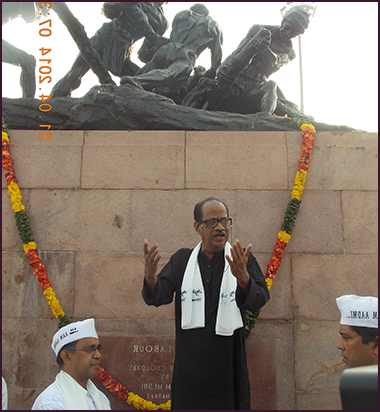
Gnani joined the Aam Aadmi Party in 2014. In his 44 years of public life, this was the first time he had been a member of any political party. “There are symptoms of next wave of change in the current electoral politics as it had happened in 1967, 1977 & 1987. With a concern that the current change shouldn’t fail like the earlier instances, I am entering the party, electoral politics so as to contribute and to be the encouraging force for others to walk down that road. Our job is to write, to work for the country beyond writing and to remain active as long as we are alive” Gnani stated then.
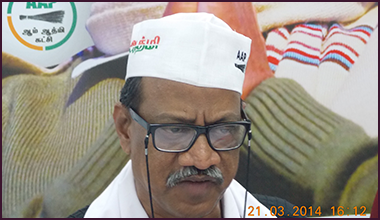
Subsequently, he contested as the AAP candidate in the Alandur Legislative Assembly in 2014. His received 5727 votes in this election. In the absence of a full functional AAP in the region, the total number of votes he won was translating to 2.8635%. He conducted the election campaign in a simple, yet sensitive way and publicly published the details of donations and his election expenses. Out of total collection of Rs. 3.86 lakh, Rs 3.39 lakhs was spent for election. He returned 38,500 rupees, which Aam Aadmi Party gave for election expenses back to the party. He also returned around ten thousand rupees to all the donors who donated more than ten thousand rupees for his campaign. He donated the left over money to the schools where poor students were studying
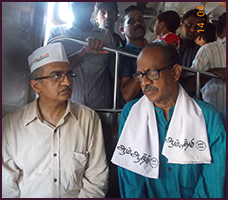
"Yes, I joined the Aam Aadmi Party and participated in its election campaign for a 22-day and two months later after losing the election, I withdrew from the party. I had been in the party for about 100 days. I am leaving the full-time politics in the wake of poor health my body and as well as that of party’s” He announced.
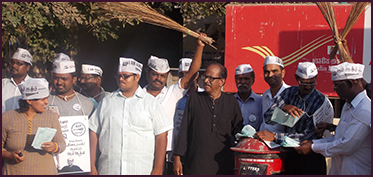
“With respect to AAP, The situation inside the party was worse than my expectations. I have no difference with the leadership in Delhi. I have no regrets neither about joining the party, nor about leaving it. I don’t have any regrets about losing the election either.
It is more important for Indian politics to understand that AAP is more of a concept rather than a party. Even if I'm not in the AAP, I would continue to support it. It is my strong belief that in the Indian political context, the AAP and the leftist movements are the only remaining tools to lead us to a healthy federal, equitable and honest political environment” Gnani commented in an interview.
The ‘Vizhi Tamil Nadu’ movement is an awareness movement to bring complete ban of alcohol in Tamil Nadu. It is the awareness movement aimed to bring a new and alternative view about the society. The purpose of the movement is to raise this issue and break the silence of so called ‘civil society’ which includes intellectuals of our community, scholars and educated section of the society and pull together all the men and women who are affected by alcohol and to put pressure on the political parties and the representatives of the public to focus on the issue.
Gnani remained as the organizer of this movement which had active participation from some luminaries like retired Supreme Court Judge K. Chandru, former Vice-Chancellor Vasanthi Devi etc.
Vizhi Movement published ‘Handbook for activists’ written by High Court Judge K. Chandru which answered the questions of general public like, ‘Is there a law in place to close the liquor shops in our areas? Will the courts come to our support? Where to go for financial aid to file a law suit? How to manage the needed lawyer fees? etc.
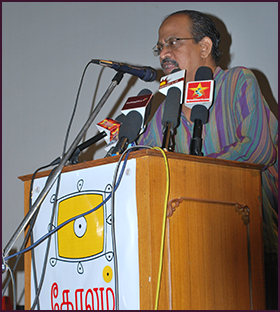
Kolam is a movement which aimed to bring Cinemas direct to home. It is to give shape to a longtime dream of bringing a direct relationship between a creator and his audience and to remove all the intermediaries like producers, financiers distributors etc. The goal of the movement is to form an alternative system outside the conventional production and distribution system.
It is a movement that creates a direct relationship with the creator and the audience. The audience exist as numerous dots and the purpose of Kolam is help creators to connect these points together. Gnani was the Founder of this Kolam movement which attempted to unite everyone in town to pull the chariot.
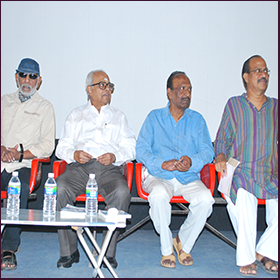
Gnani also executed other cultural activities under the Kolam Foundation, it had had Announced in the memory of the writer Asokamitran, the best short stories will be awarded,. Subsequently, the best short stories had been awarded since 2016-17. In the first year, six short stories which were awarded are collated and released as a book. This awarding continues even after his death on behalf of the Kolam foundation.
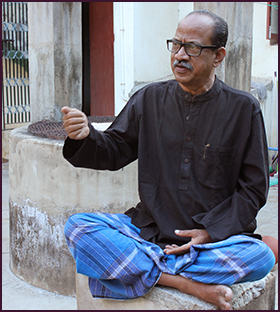
Gnani arranged a literary meet around a well in the backyard of his residence at Alagirisamy Road in Kalaignar Karunanidhi Nagar, which he named as Keni.
The first meeting was held on the second Sunday of June 2009, when S. Ramakrishnan shared his literary experiences.
Following that, multiple leading personas in various domains like Prapanchan, Ki.Ra. Ashokamitran, Dilip Kumar, Balu Mahendram, Jeyamohan, Director Mahendran, poet Sukumaran, Bama, Nanjil Nadan, painters Manohar Devadas, Trotsky Marudu, Sa. Kanthasamy, Gnanakoothan, Va.Geetha, Actor Nassar, Charu Nivedita, Inkulab, Justice Chandru, A. Marx, Perumal Murugan, A.R. Venkatachalapathy, Raj Gowdhaman, Mammad, Akila, R. Nallakannu had participated and added value to these literary meetings, which Gnani formed along with Bhaskar Sakthi, to make it one of the most renowned and well attended literary meets in the city.
